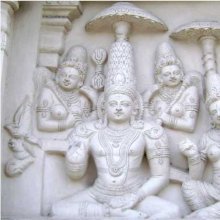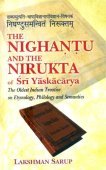Ha: 15 definitions
Introduction:
Ha means something in Hinduism, Sanskrit, Marathi, Hindi, biology, Tamil. If you want to know the exact meaning, history, etymology or English translation of this term then check out the descriptions on this page. Add your comment or reference to a book if you want to contribute to this summary article.
Images (photo gallery)
(+34 more images available)
In Hinduism
Vyakarana (Sanskrit grammar)
Source: Wikisource: A dictionary of Sanskrit grammar1) Ha (ह).—Representation of the consonant हू (hū) with अ (a) added for facility of pronunciation;
2) Ha.—A technical term for the internal effort between विवृत (vivṛta) and संवृत (saṃvṛta), which causes घोष (ghoṣa) in the consonants; cf. संवृतविवृतयोर्मध्ये मध्यमप्रक्रारे यः शब्दः क्रियते स हकारसंज्ञो भवति। संज्ञायाः प्रयेजनं (saṃvṛtavivṛtayormadhye madhyamaprakrāre yaḥ śabdaḥ kriyate sa hakārasaṃjño bhavati| saṃjñāyāḥ prayejanaṃ) 'हकारो हचतुर्थेषु (hakāro hacaturtheṣu)' इति (iti) (तै (tai). प्रा (prā). २/९)। (|) Tribhasyaratna on T.Pr. II.6;
3) Ha.—Name of an external effort causing घोष (ghoṣa); cf. सांप्रतिके प्रकृतिस्थे कण्ठे सति हृकारो नाम बाह्यः प्रयत्नः क्रियते । तेन च व्यञ्जनेषु घोषो जायते। (sāṃpratike prakṛtisthe kaṇṭhe sati hṛkāro nāma bāhyaḥ prayatnaḥ kriyate | tena ca vyañjaneṣu ghoṣo jāyate|) Vaidikabharana on T.Pr. II.6;
4) Ha.—Name of a kind of external effort of the type of अनुप्रदान (anupradāna) found in the utterance of the consonant (ह् (h)) and the fourth class-consonants; cf. हकारौ हृचतुर्थेषु (hakārau hṛcaturtheṣu) T.Pr.II.9.

Vyakarana (व्याकरण, vyākaraṇa) refers to Sanskrit grammar and represents one of the six additional sciences (vedanga) to be studied along with the Vedas. Vyakarana concerns itself with the rules of Sanskrit grammar and linguistic analysis in order to establish the correct context of words and sentences.
Biology (plants and animals)
Source: Google Books: CRC World Dictionary (Regional names)1) Ha in Nigeria is the name of a plant defined with Khaya senegalensis in various botanical sources. This page contains potential references in Ayurveda, modern medicine, and other folk traditions or local practices It has the synonym Swietenia senegalensis Desr. (among others).
2) Ha in Thailand is also identified with Syzygium cumini It has the synonym Calyptranthes jambolana (Lam.) Willd. (etc.).
Example references for further research on medicinal uses or toxicity (see latin names for full list):
· Numer. List (3552)
· Encycl. (Lamarck) (1789)
· U.S. Department of Agriculture Bureau of Plant Industry Bulletin (1912)
· Ned. Kruidk. Arch. (1848)
· Mémoires du Muséum d’Histoire Naturelle (1830)
· Journal of Cytology and Genetics (1988)
If you are looking for specific details regarding Ha, for example pregnancy safety, chemical composition, health benefits, side effects, extract dosage, diet and recipes, have a look at these references.

This sections includes definitions from the five kingdoms of living things: Animals, Plants, Fungi, Protists and Monera. It will include both the official binomial nomenclature (scientific names usually in Latin) as well as regional spellings and variants.
Languages of India and abroad
Marathi-English dictionary
Source: DDSA: The Molesworth Marathi and English Dictionaryha (ह).—The thirty-third consonant. It corresponds with H.
--- OR ---
hā (हा).—pron (idam S) He; or this (person or thing expressed by a word of the masculine gender). 2 There is a striking use of this pronoun in order to convey the impression of instantaneity, or superlative briefness of time, or extreme celerity of action. Ex. tumhī puḍhēṃ calā hā mī māgūna yētōṃ; i. e. This very I (unaffected by the lapse even of a moment, the very identical composition now before you) will rejoin you; mī hāca ālōṃ, mī hāca yēīna &c. I am returned the very person that left you; i. e. I am back in a trice. The word is declinable. 3 An interjection of hasty prohibition or menacing repression. 4 interj (S) Alas! ha! ah!
Source: DDSA: The Aryabhusan school dictionary, Marathi-Englishha (ह).—The thirty-third consonant.
--- OR ---
hā (हा).—pro He, or this. interj Alas! ha! ah! An interjection of prohibition. Used to indicate instantaneity, as tumhī calā hā mī māgūna yētōṃ.
Marathi is an Indo-European language having over 70 million native speakers people in (predominantly) Maharashtra India. Marathi, like many other Indo-Aryan languages, evolved from early forms of Prakrit, which itself is a subset of Sanskrit, one of the most ancient languages of the world.
Sanskrit dictionary
Source: DDSA: The practical Sanskrit-English dictionaryHa (ह).—ind. An emphatic particle used to lay stress on the preceding word and translateable by 'verily', 'indeed', 'certainly', &c.; but it is often used expletively without any particular signification, especially in Vedic literature; तस्य ह शतं जाया बभूवुः (tasya ha śataṃ jāyā babhūvuḥ); तस्य ह पर्वतनारदौ गृह उषतुः (tasya ha parvatanāradau gṛha uṣatuḥ) &c. Ait. Br.; द्वया ह प्राजापत्या देवाश्चासुराश्च (dvayā ha prājāpatyā devāścāsurāśca) Bṛ. Up.1.3.1. It is sometimes used as a vocative particle and rarely of disdain or laughter.
-haḥ 1 A form of Śiva.
2) Water.
3) Sky.
4) Blood.
5) A cipher.
6) Meditation.
7) Auspiciousness.
8) Paradise.
9) Heaven.
1) Drying.
11) Fear.
12) Knowledge.
13) The moon.
14) Name of Viṣṇu.
15) War, battle.
16) A horse.
17) Pride.
18) Horripilation.
19) A physician.
2) Cause, motive.
-ham 1 The Supreme Spirit.
2) Pleasure, delight.
3) A weapon.
4) The sparkling of a gem.
5) The sound of a lute (-m. also according to some in these senses).
--- OR ---
Hā (हा).—ind. A particle expressing
1) Grief, dejection, pain, as expressed by 'ah', 'alas!', 'woe me', in English; हा प्रिये जानकि (hā priye jānaki) Uttararāmacarita 3; हा हा देवि स्फुटति हृदयम् (hā hā devi sphuṭati hṛdayam) Uttararāmacarita 3.38; हा पितः क्वासि हे सुभ्रु (hā pitaḥ kvāsi he subhru) Bhaṭṭikāvya 6.11; हा वत्से मालति क्वासि (hā vatse mālati kvāsi) Mālatīmādhava (Bombay) 1 &c.; (in this sense hā is often used with the acc. of person; hā kṛṣṇābhaktam Sk.).
2) Surprise; हा कथं महाराज- दशरथस्य धर्मदाराः प्रियसखीं मे कौसल्या (hā kathaṃ mahārāja- daśarathasya dharmadārāḥ priyasakhīṃ me kausalyā) Uttararāmacarita 4.
3) Anger or reproach.
--- OR ---
Hā (हा).—I. 3 Ā. (jihīte, hāna; pass. hāyate; desid. jihāsate)
1) To go, move; जिहीथा विख्यातां स्फुटमिह भवद्बान्धवरथम् (jihīthā vikhyātāṃ sphuṭamiha bhavadbāndhavaratham) H. D.28; Kirātārjunīya 13.23; Nalod.1.38.
2) To get, attain. -II. 3 P. (jahāti, hīna)
1) To leave, abandon, quit, give up, forsake, relinquish, dismiss; मूढ जहीहि धनागम- तृष्णां कुरु तनुबुद्धे मनसि वितृष्णाम् (mūḍha jahīhi dhanāgama- tṛṣṇāṃ kuru tanubuddhe manasi vitṛṣṇām) Moha M.1; सा स्त्रीस्वभावाद- सहा भरस्य तयोर्द्वयोरेकतरं जहाति (sā strīsvabhāvāda- sahā bharasya tayordvayorekataraṃ jahāti) Mu.4.13; R.5.72;8.52; 12.24;14.61,87;15.59; Ś.4.14; बुद्धिर्युक्तो जहातीह उभे सुकृतदुष्कृते (buddhiryukto jahātīha ubhe sukṛtaduṣkṛte) Bhagavadgītā (Bombay) 2.5; Bhaṭṭikāvya 3.53;5.91;1.71;2. 1; Meghadūta 51,62; Bv.2.129; Ṛtusaṃhāra 1.38.
2) To resign, forego.
3) To let fall.
4) To omit, disregard, neglect.
5) To remove.
6) To avoid, shun. -Pass. (hīyate)
1) To be left or forsaken; भिन्नतिमिरनिकरं न जहे शशिरश्मि- संगमयुजा नभः श्रिया (bhinnatimiranikaraṃ na jahe śaśiraśmi- saṃgamayujā nabhaḥ śriyā) Kirātārjunīya 12.12.
2) To be excluded from, be deprived of, lose (with instr. or abl.); विरूपाक्षो जहे प्राणैः (virūpākṣo jahe prāṇaiḥ) Bhaṭṭikāvya 14.35; जनयित्वा सुतं तस्यां ब्राह्मण्यादेव हीयते (janayitvā sutaṃ tasyāṃ brāhmaṇyādeva hīyate) Manusmṛti 3. 17;5.161;9.211.
3) To be deficient or wanting in; usually with परि (pari) q. v.; धैर्य यस्य न हीयते (dhairya yasya na hīyate) Pañcatantra (Bombay) 1.13.
4) To diminish, decrease, decay, decline, wane (fig. also); प्रवृद्धो हीयते चन्द्रः समुद्रोऽपि तथाविधः (pravṛddho hīyate candraḥ samudro'pi tathāvidhaḥ) R.17.71; H. Pr.42.
5) To fail (as in a low-suit); भूतमप्यनुपन्यस्तं हीयते व्यवहारतः (bhūtamapyanupanyastaṃ hīyate vyavahārataḥ) Y.2.19.
6) To be left out or omitted.
7) To be weakened. -Caus. (hāpayati-te)
1) To cause to leave, abandon &c.
2) To drive away, expel.
3) To lose.
4) To neglect, omit, delay the performance of; द्रुतमेतु न हापयिष्यते सदृशं तस्य विधातुमुत्तरम् (drutametu na hāpayiṣyate sadṛśaṃ tasya vidhātumuttaram) Śiśupālavadha 16.33; Manusmṛti 3.71; 4.21; Y.1.121. -Desid. (jihāsati) To wish to leave &c.
Source: Cologne Digital Sanskrit Dictionaries: Shabda-Sagara Sanskrit-English DictionaryHa (ह).—The thirty-third and last consonant of the Deva-Nagari alphabet the letter “H.”
--- OR ---
Ha (ह).—Subst. mfn.
(-haḥ-hā-haṃ) Laughter. Adj. Mad, drunk. m.
(-haḥ) 1. Siva. 2. Water. 3. A cypher. 4. Meditation. 5. Auspiciousness. 6. Sky heaven. 7. Paradise. 8. Blood. 9. Dying. 10. Fear. 11. Knowledge. 12. The moon. 13. Vishnu. 14. War, battle. 15. Horripila tion. 16. A horse. 17. Pride. 18. A physician. 19. Cause, motive f.
(-hā) 1. A bandoning, leaving. 2. Coition. 3. A lute. n.
(-haṃ) 1. God, the supreme soul. 2. Pleasure, delight. 3. Calling, calling to 4. A weapon. 5. The sparkling of a gem. 6. The sound of a lute. Ind. 1. An expletive. 2. A vocative particle, (ho ! holla !) 3. A term or rejection or disdain. 4. A particle of abuse or reproach see hā, hī &c. 5. An emphatic particle laying stress on the preceding word and equivalent to “varily,” “indeed,” “evidently.” E. hā to abandon, or han to strike, &c., aff. ka or ḍa .
--- OR ---
Hā (हा).—r. 3rd cl. (o, ka) ohāk (jahāti) 1. To quit, to leave, to abandon. 2. To wander or deviate. 3. To let fall. 4. To resign. 5. To neglect. With pari, 1. To relinguish. 2. To omit, to neglect. With pra, 1. To give up. 2. To let go. With ap, To abandon. With vi, To give up. (o, ṅa) ohāṅ (jihīte) 1. To go, to move. 2. To attain. With ud, 1. To go up, to rise. 2. To revive, to come to life. 3. To spring up. 4. To rise, (as the sun or moon.) 5. To depart. 6. To raise. With upa, To come down. With sam, To attain.
--- OR ---
Hā (हा).—Ind. 1. An interjection of pain, weariness, “ah,” “alas.” 2. Of sorrow. 3. An exclamation of pleasure or surprise, “oh” “ha.” 4. A term of anger or reproach. In the sense of “woe be to” hā is used with the accusative of the object of reproach. E. hā to abandon, aff. kā .
Source: Cologne Digital Sanskrit Dictionaries: Benfey Sanskrit-English DictionaryHa (ह).—1. = ved. gha, [Lassen, Anthologia Sanskritica.] 98, 2 = [Rigveda.] vi. 64, 5. 2. A particle laying a stress on the preceding word (as ), or without a distinct signification, [Mānavadharmaśāstra] 9, 28;
— Cf. [Latin] ha, ho, hi, in hic, hæc, hoc; [Gothic.] prefix, ga-; [Anglo-Saxon.] ge-; see gha.
--- OR ---
Ha (ह).—[-ha] (vb. han), at the end of comp. adj. Killing, [Pāṇini, (ed. Böhtlingk.)] iii. 2, 49.
--- OR ---
Hā (हा).—ii. 3, jihā, [Ātmanepada.] 1. To give way (ved.). 2. To go, [Kirātārjunīya] 13, 23.
— With ud ud, 1. To rise, [Daśakumāracarita] in
— With upa upa, To descend, [Śiśupālavadha] 1, 37.
— With sam sam, To obtain, [Nalodya, (ed. Benary.)] 1, 54.
— Cf. [Latin] in-hiare, hiscere; O. H. G. gīên, ginên, geinôn; A. S. ginan, cinan, geonan, gynian, ganian.
--- OR ---
Hā (हा).— (akin to the last), ii. 3, jahā, [Parasmaipada.] 1. To abandon, to leave, Mahābhārata 3, 12339; to forsake, [Mānavadharmaśāstra] 6, 42. 2. To avoid, [Pañcatantra] iii. [distich] 71. 3. To remove, Mahābhārata 1, 2301. 4. To resign, [Bhagavadgītā, (ed. Schlegel.)] 2, 50. 5. To let fall, [Hitopadeśa] ii. [distich] 120. 6. To lose, [Rāmāyaṇa] 2, 63, 50. Pass. hīya, 1. To be forsaken, [Mānavadharmaśāstra] 6, 42. 2. To be lost, [Pañcatantra] ii. [distich] 6. 3. To be deprived, [Mānavadharmaśāstra] 3, 17; 5, 161. 4. To be omitted, Mahābhārata 1, 6424. 5. To become weary or weak, Mahābhārata 1, 6291. 6. To be lowered, [Hitopadeśa] pr. 42. 7. To fail (in a lawsuit), [Mānavadharmaśāstra] 8, 56; cf. [Pañcatantra] 166, 18. Ptcple. of the pf. pass. hīna. 1. Deprived, [Mānavadharmaśāstra] 8, 232; [Rāmāyaṇa] 3, 51, 40. 2. Free from. 3. Wasted, decayed, feeble, [Pañcatantra] iii. [distich] 133. 4. Dencient, defective. 5. Lower, less, Man 2, 194. 6. Blameable, vile, bad, low, [Mānavadharmaśāstra] 3, 107. m. An objectionable witness. Comp. Pāda-hīnāt, abl., adv. on a sudden, [Suśruta] 2, 145, 12. Phala-, adj. yielding no profit, [Pañcatantra] i. [distich] 168. Absol. hitvā, Neglecting, without regarding, [Hitopadeśa] iv. [distich] 17. Desider. jihāsa, To wish to leave, [Daśakumāracarita] in
— With apa apa, To leave, [Vikramorvaśī, (ed. Bollensen.)] 33, 13; [Nala] 24, 11. Absol. apahāya, Besides, [Raghuvaṃśa, (ed. Stenzler.)] 6, 19 (whom did Lakṣmī worship besides him?).
— With ava ava, pass. To be left, Mahābhārata 3, 11558.
— With vyava vi-ava, To abandon, Mahābhārata 3, 13661.
— With apā apa-ā, 1. To leave, Mahābhārata 1, 4946. 2. To pass by, Mahābhārata 3, 2963 (= [Nala] 24, 13, Bopp., apahāya, against the metre). Absol. apāhāya, Except (except immortality, speak what you wish for), Mahābhārata 3, 11982 (= [Arjunasamāgama] 3, 47, Bopp., apahāya, against the metre).
— With ni ni, nihīna, Low, vile.
— With pari pari, pass. 1. To decrease, Mahābhārata 3, 12858; with aṅgais, [Śākuntala, (ed. Böhtlingk.)] 34, 12 ([Prakrit] Thy limbs become thinner). 2. To be wanting, [Rāmāyaṇa] 1, 2, 16 (act so that nothing may be wanting); to be unacquainted with, [Mālatīmādhava, (ed. Calc.)] 69, 18. 3. To be deprived, [Mānavadharmaśāstra] 9, 254. 4. To be lost, [Hitopadeśa] ii. [distich] 68. 5. To be avoided, [Hitopadeśa] ii. [distich] 54. 6. To be omitted, to be sinped, Mahābhārata 2, 2460 (with the termination of the [Parasmaipada.]). parihīna, 1. Deprived, Bhāṣāp. 14. 2. Waned, decayed. [Causal.] To abandon, [Mānavadharmaśāstra] 8, 206.
— With pra pra, 1. To leave, Mahābhārata 1, 4620. 2. Pass. To be lost, to perish, [Mānavadharmaśāstra] 4, 41; to be relinquished, [Kirātārjunīya] 14, 13.
— With vipra vi-pra, viprahīṇa, 1. Abandoned,
— With vi vi, To abandon, [Lassen, Anthologia Sanskritica.] 2. ed. 77, 65; to leave, [Śākuntala, (ed. Böhtlingk.)] [distich] 67; [Vikramorvaśī, (ed. Bollensen.)] [distich] 41. vihīna, 1. Deprived, void of, without, [Bhartṛhari, (ed. Bohlen.)] 2, 17; [Rāmāyaṇa] 2, 52, 37; [Pañcatantra] iii. [distich] 24. 2. Free from, [Raghuvaṃśa, (ed. Stenzler.)] 18, 13. Comp. Pṛcchā-, adj. one who has not asked, [Pañcatantra] i. [distich] 438. [Causal.] vihāpita, 1. Given. 2. Extorted. n. Gift.
— With pravi pra-vi, To neglect, to disdain, [Pañcatantra] iv. [distich] 36.
— Cf. [Gothic.] gaidv, giban; A. S. gifan (= hāpaya, cf. vihāpita), gafol, gaefel, gif; Engl. if; [Latin] habere.
--- OR ---
Hā (हा).—an interj. 1. Of pain, weariness, grief, Ah! [Mālatīmādhava, (ed. Calc.)] 153, 21; [Rāmāyaṇa] 3, 50, 22; 55, 35; sorrow, Woe! [Vikramorvaśī, (ed. Bollensen.)] 61, 7. 2. Of joy. 3. Of reproach, [Rāmāyaṇa] 3, 51, 25. 4. Of wrath, [Mālatīmādhava, (ed. Calc.)] 82, 5. Repeated, hāhā hā-hā, interjection of, 1. Surprise. 2. Grief, [Pañcatantra] 35, 10.
Source: Cologne Digital Sanskrit Dictionaries: Cappeller Sanskrit-English DictionaryHa (ह).—1. ([enclitic]) to be sure, indeed ( = older gha), often expletive, [especially] at the end of a verse.
--- OR ---
Ha (ह).—2. (—°) killing, slaying.
--- OR ---
Hā (हा).—1. jihīte [participle] hāna (only —°) start up, go forth, move on; run away from, yield ([dative]); rush upon ([accusative]), fly (arrow).
--- OR ---
Hā (हा).—2. jahāti , [participle] hīna & jahita (q.v.) leave, forsake, abandon; emit, discharge, take off, cast aside, remove; give up, avoid, shun, lose. [Passive][Middle] hīyate (hīyate, ti) be left etc., remain behind, come short or be deprived of ([ablative] or [instrumental]); come to harm, be a loser, fail (in a lawsuit etc.); decrease, wane, perish, be lost. [Causative] hāpayati, te neglect, omit, give up, miss, lose. [Desiderative] jihāsati wish to leave etc.
--- OR ---
Hā (हा).—3. [exclamation] of pain, astonishment, or joy, mostly [with] vocative; [with] [accusative] woe to! Often repeated or connected [with] dhik, hanta etc.
Source: Cologne Digital Sanskrit Dictionaries: Monier-Williams Sanskrit-English Dictionary1) Ha (ह):—1. ha the thirty-third and last consonant of the Nāgarī alphabet (in Pāṇini’s system belonging to the guttural class, and usually pronounced like the English h in hard; it is not an original letter, but is mostly derived from an older gh, rarely from dh or bh).
2) 2. ha m. (only [cf. Lexicographers, esp. such as amarasiṃha, halāyudha, hemacandra, etc.]) a form of Śiva or Bhairava (cf. nakulīśa)
3) water
4) a cipher (id est. the arithmetical figure which symbolizes o)
5) meditation, auspiciousness
6) sky, heaven, paradise
7) blood
8) dying
9) fear
10) knowledge
11) the moon
12) Viṣṇu
13) war, battle
14) horripilation
15) a horse
16) pride
17) a physician
18) cause, motive
19) = pāpa-haraṇa
20) = sakopa-vāraṇa
21) = śuṣka
22) mf. laughter
23) Hā (हा):—[from ha] a f. coition
24) [v.s. ...] a lute
25) Ha (ह):—n. the Supreme Spirit
26) pleasure, delight
27) a weapon
28) the sparkling of a gem
29) calling, calling to the sound of a lute
30) ind. = aham (?), [Indische Studien by A. Weber]
31) mfn. mad, drunk.
32) 3. ha ind. ([probably] [originally] identical with 2. gha, and used as a particle for emphasizing a preceding word, [especially] if it begins a sentence closely connected with another; very frequent in the Brāhmaṇas and Sūtras, and often translatable by) indeed, assuredly, verily, of course, then etc. (often with other particles e.g. with tv eva, u, sma, vai etc.; na ha, ‘not indeed’; also with interrogatives and relatives e.g. yad dha, ‘when indeed’; kad dha, ‘what then?’ sometimes with [imperfect tense] or [perfect tense] cf. [Pāṇini 3-2, 116]; in later language very commonly used as a mere expletive, [especially] at the end of a verse), [Ṛg-veda]; etc.
33) 4. ha mf(ā)n. ([from] √han) killing, destroying, removing (only ifc.; See arāti-, vṛtra-, śatruha etc.)
34) 5. ha mf(ā)n. ([from] √3. hā) abandoning, deserting, avoiding (ifc.; See an-okaand vāpī-ha)
35) Hā (हा):—[v.s. ...] b f. abandonment, desertion, [cf. Lexicographers, esp. such as amarasiṃha, halāyudha, hemacandra, etc.]
36) Ha (ह):—[from han] a See 4. ha, p. 1286, col. 1.
37) Hā (हा):—1. hā ind. an exclamation expressive of pain, anger, astonishment, satisfaction etc. (= ah! alas! oh! ha! often before or after a [vocative case] case, also repeated hā-hā cf. 1. hahā above, or followed by other particles, [especially] dhik, hanta, kaṣṭam etc.), [Mahābhārata; Kāvya literature] etc.,
38) 2. hā (not always separable [from] √3. hā) [class] 3. [Ātmanepada] ([Dhātupāṭha xxv, 7]) jihīte (p. jihāna q.v.; [perfect tense] jahire, [Atharva-veda]; [Aorist] ahāsta, [Ṛg-veda] etc.; [future] hātā [grammar]; hāsyate, [Brāhmaṇa; Mahābhārata]; [infinitive mood] -hātum, [ib.]; [indeclinable participle] hātvā [grammar]; -hāya, [Ṛg-veda]),
—to start or spring forward, bound away, give way to ([dative case]), [Ṛg-veda];
—to spring or leap upon (?), [Ṛg-veda x, 49, 5];
—to go or depart or betake one’s self to have recourse to ([accusative]), [Nalôd.] ;
—to fall or come into any state, [Kirātārjunīya] :—[Passive voice] hāyate ([Aorist] ahāyi) [grammar]:—[Causal] hāpayati ([Aorist] ajīhapat), [ib.] :—[Desiderative] jihāsate, [ib.] :—[Intensive] jahāyate, jāhāti, jāheti, [ib.]
39) 3. hā [class] 3. [Parasmaipada] ([Dhātupāṭha xxv, 8]) jahāti (rarely [class] 1. jahati 3. [dual number] jahItaH [imperative] jahIhi [or jahāhi, [Pāṇini 6-4, 117]]; jahītāt, [Atharva-veda]; [Potential] jahyāt, [Atharva-veda] etc.; [perfect tense] jahau, jahuḥ, [Ṛg-veda] etc.; jahe, [Brāhmaṇa]; [Aorist] ahāt, [ib.] etc.; ahāsīt [grammar]; 3. sg. ahās, [Ṛg-veda]; ahāsi, [Atharva-veda]; hāsiṣṭa, [ib.],; [future] hātā [grammar]; hāsyati, te, [Atharva-veda] etc., jahiṣyati, [Mahābhārata] etc.; [infinitive mood] hātum, [ib.]; [indeclinable participle] hitvā. q.v. [Ṛg-veda] etc.; hitvī tvāya, [Ṛg-veda]; -hītvā [grammar]; -hāya, [Brāhmaṇa], hīyam, [Taittirīya-saṃhitā]),
—to leave, abandon, desert, quit, forsake, relinquish (with śarīram, deham, prāṇān, asūn, jīvitam etc. - ‘to die’), [Ṛg-veda] etc., etc.;
—to discharge, emit, [ib.];
—to put away, take off, remove, lay aside, give up, renounce, resign, avoid, shun, abstain or refrain from, [Manu-smṛti; Mahābhārata] etc.;
—to disregard, neglect, [ib.];
—to lose, be deprived of [Rāmāyaṇa; Kāmandakīya-nītisāra];
—to get rid of. escape from, [Upaniṣad; Mahābhārata] etc.;
—to cause to emit (with śardham, ‘to cause to break wind’), [Vopadeva] :—[Passive voice] hīyate or hīyate ([Epic] also hīyati; [Aorist] ahāyi),
—to be left or abandoned or deserted etc.;
—to be left behind, fall short of ([ablative]), [Ṛg-veda] etc. etc.;
—to be excluded from or bereft of ([ablative] or [instrumental case]; with prāṇaiḥ, ‘to die’), [Kaṭha-upaniṣad; Manu-smṛti; Mahābhārata] etc.;
—to be overtaken by ([instrumental case]), [Mahābhārata];
—to be deficient or wanting, suffer loss or injury, fail (also in a lawsuit), decrease, wane, decline, come to an end, [Chāndogya-upaniṣad; Manu-smṛti; Mahābhārata] etc.;
—to weigh less (at the ordeal of the balance), [Yājñavalkya [Scholiast or Commentator]];
—to be given up or avoided, [Bhartṛhari] ([varia lectio]);
—to be subtracted, [Varāha-mihira’s Bṛhat-saṃhitā];
—to become detached from (with [ablative] or [instrumental case]), fall out (as hair), [Bhāgavata-purāṇa] :—[Causal] hāpayati (mc. also te [Aorist] ajīhapat; -jīhipaḥ, [Ṛg-veda]),
—to cause to leave or abandon etc.;
—to omit, neglect, [Manu-smṛti; Mahābhārata] etc.;
—to fall short of. be wanting in ([accusative]), [Mahābhārata; Cāṇakya];
—to give up (asūn, ‘life’), [Harivaṃśa];
—to lose (kālam, ‘time’), [Kāmandakīya-nītisāra];
—to abandon (pratijñām, ‘a thesis’), [Jātakamālā] :—[Desiderative] jihāsati, to wish to leave or abandon, [Daśakumāra-carita; Bhāgavata-purāṇa; Hemacandra’s Pariśiṣṭaparvan];
—to wish to reject or disdain, [Prabodha-candrodaya];
—to wish to escape, [Sarvadarśana-saṃgraha] :—[Intensive] jehīyate, jāhāti, jāheti [grammar]
40) Ha (ह):—[from hā] b See 5. ha, p. 1286, col. 1.
Source: Cologne Digital Sanskrit Dictionaries: Yates Sanskrit-English Dictionary1) Ha (ह):—The letter h.
2) (haḥ) 1. m. Shiva; water; meditation; auspiciousness; heaven; dying; blood; battle; horse; pride; a physician; fear; horripilation; Vishnu; cause. 1. f. Leaving; coition; a lute. n. God; joy; calling; a weapon; a gem; sound of a lute. a. Laughing; mad; drunk. adv. Ho! hola! expletive or particle of abuse.
3) Hā (हा):—(li ñā) jahāti 3. a. To quit, to wander from. jihate 3. d. To go.
4) interj. Expressive of weariness, sorrow, pleasure, reproach.
[Sanskrit to German]
Sanskrit, also spelled संस्कृतम् (saṃskṛtam), is an ancient language of India commonly seen as the grandmother of the Indo-European language family (even English!). Closely allied with Prakrit and Pali, Sanskrit is more exhaustive in both grammar and terms and has the most extensive collection of literature in the world, greatly surpassing its sister-languages Greek and Latin.
Hindi dictionary
Source: DDSA: A practical Hindi-English dictionary1) Ha (ह) [Also spelled h]:——the last and the thirty-third letter of the Devnagri: alphabet, aspirated in sound.
2) Hā (हा):—(int) oh !, Gosh !, a particle expressive of pleasure, pain, regret, contempt, amazement, etc.; a Persian suffix which imparts plurality (as [bārahā, hajārahā,] etc.).
...
Kannada-English dictionary
Source: Alar: Kannada-English corpusHa (ಹ):—
1) [noun] (gen. pronounced with the vowel 'a') the forty seventh letter of Kannaḍa alphabet and the thirty third consonant.
2) [noun] (math.) a symbol for the number eight.
--- OR ---
Hā (ಹಾ):—[interjection] an interjection used to express pain, wonder, mental shock, etc.
Kannada is a Dravidian language (as opposed to the Indo-European language family) mainly spoken in the southwestern region of India.
Tamil dictionary
Source: DDSA: University of Madras: Tamil LexiconHa (ஹ) . The compound of ஹ் [h] and அ. [a.]
--- OR ---
Hā (ஹா) . The compound of ஹ் [h] and ஆ. [a.]
--- OR ---
Hā (ஹா) interjection Expr. of surprise, pain, sorrow, etc.; வியப்பு நோவு துயரம் முதலியவற் றைக் குறிக்குஞ் சொல். [viyappu novu thuyaram muthaliyavar raig kurikkugn sol.]
Tamil is an ancient language of India from the Dravidian family spoken by roughly 250 million people mainly in southern India and Sri Lanka.
See also (Relevant definitions)
Starts with (+8174): Alya, Barhishtha, Ha kho thao, Ha re nu ka, Ha thu o trang, Ha-angouba, Ha-azami, Ha-khi-phae, Ha-mung, Haa, Haaavu, Haablou, Haachhyun-jhaar, Haadaga, Haadajojen, Haadaragithi balli, Haadari, Haadige, Haadnata, Haadnatakarani.
Ends with (+9980): A gni ma ntha, A-cata-bhata-pravesha, A-catta-bhatta-pravesha, A-lavana-guda-kshobha, A-pushpa-kshira-sandoha, A-shuddha-paksha, Aaccha, Aacha, Aadalodakathila pacha, Aaha, Aakarakarabha, Aakkha, Aamcha, Aaqarqarha, Aatha, Aattudharbha, Ababaddha, Ababamdha, Ababoha, Ababujjha.
Full-text (+4764): Ham, Anokaha, Darpaha, Aniha, Anavagraha, Saspriha, Avaha, Pataha, Duhsaha, Vatasaha, Nadaha, Ladaha, Durudvaha, Aspriha, Nirutsaha, Avigraha, Asaha, Lobhaviraha, Nispriha, Sarbbamsaha.
Relevant text
One of your search terms exceeds the minimun character amount per search term. This amount currently equals 2.
No search results for Ha, Hā, Haa; (plurals include: Haas) in any book or story.
Related products








